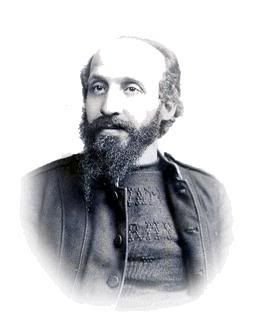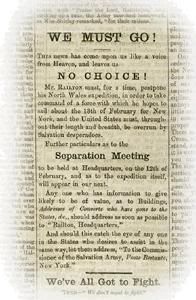
George Scott Railton was one of the most unique personalities to ever help shape the character of The Salvation Army.
The son of a Methodist minister, both of his parents died from fever when he was 15. He worked on his own in London, seeking something that was more like the old Methodism of John Wesley, eventually finding the Christian Mission and the work of William Booth.
At William’s invitation, he moved into their home to become Booth’s secretary. In this position, he shared his beliefs of theology and contributed many of his own views to the fledgling Salvation Army, particularly concerning the Sacraments.
By 1880, Bramwell Booth took on the roll of secretary and Railton—who always had a desire for mission work—persuaded Booth to support him in beginning the Army’s work in New York. With male officers being in short supply, he selected Captain Emma Westbrook and recruited six more young women with the thought of training them on the voyage to America.
The reports were reprinted at length in the London War Cry on 31 January 1880, and included this bold notice:

“WE MUST GO! This news has come upon us like a voice from Heaven and leaves us no choice. Mr. Railton must for a time postpone his North Wales expedition in order to take command of a force with which he hopes to sail about 13th February for New York, and the United States must, throughout their length and breadth, be overrun by Salvation desperadoes.”
When George Scott Railton and the seven “Hallelujah lassies” boarded the ocean liner Australia they were determined to be successful in The Salvation Army’s invasion of America. It took their ship four weeks to sail from London to New York and on March 10th, 1880, they arrived in Battery Park, New York, got off their ship, walked down the ramp, knelt in prayer on the cold ground, planted the Blood-and-Fire flag in the earth, sang a hymn and claimed America for God.
Railton and the “lassies” made swift progress in America, joining with the unofficial work already begun by Eliza Shirley and her family in Philadelphia. He also began the work in Newark, New Jersey, leaving two young women in charge. With typical zeal, he soon departed for St. Louis, Missouri, in an effort to begin work there, but was unsuccessful. By 1881, he was needed by Booth and was on his way to begin missionary work in other lands.
A talent for languages enabled him to create confidence in educated people. Visits to France, Switzerland, and Sweden took up much of his time. Somehow, he found time for courtship and marriage to Marianne Parkyn. She was a soul mate who proved adaptable to his frantic schedule and constant traveling. Eventually, she and their children made a permanent home in Margate, England where he stayed whenever possible.
In the course of his voyages, he made many contributions to the Army’s work. He translated song books in Zulu and Dutch, created the Army and Navy League for Salvationist servicemen away from home, and the Prison Gate work for recently-released prisoners. He had a particular interest in Germany, studying the language and being instrumental in sending officers to work there. His stays were so short in various countries; his wife did not have time to embroider his work shirt in the proper language for each one. Rather, Railton obtained permission to wear one embroidered only with a cross, the universal language of Christ.
In 1906, in accordance with the Booth’s wishes, he scouted China to look for possibilities for the Army’s work—which began in 1915. He also gloried in reaching the Japanese people, where he found the work already in progress. Railton was inspired by the missionary spirit in a far wider sense than is generally understood. He was a missionary not for a land or people, but for the world.
George Scott Railton also gave to the movement some of its most stirring war-songs. One of the earliest and best known of these was either written or adopted by him. It was printed, with music, in the February 1874 issue of the Christian Mission Magazine, headed “A Christian War Song” without any indication as to authorship. It was given prominence in all editions of Heathen England as “Our War-Song”, it began:
Soldier, rouse thee ! War is raging,
God and fiends the battle waging;
and for the chorus it had:
Through the world resounding,
Let the Gospel sounding
Summon all at Jesus’ call,
His glorious cross surrounding,
Sons of God, earth’s trifles leaving,
Be not faithless, but believing;
To your conquering Captain cleaving,
Forward to the fight!
Though Railton’s health began to decline in 1913, he kept up his frantic schedule with a trip to France and Holland and an impulsive stop in Cologne, Germany. After running for a train with heavy baggage, he collapsed and died at the age of 64. His first lying in state was at the men’s shelter in that city.
People from all walks of life, from all over the world, mourned his promotion to glory. World Commissioners followed the car bearing his casket. As the procession passed Parliament, a band was permitted to play for the first time in 100 years. George Scott Railton was truly God’s Soldier.
(Compiled and edited from the Central Territory Website and the International. Heritage Centre Website)